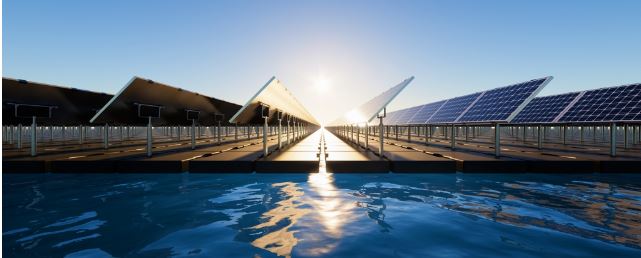


 3:11:17
3:11:17  2023-08-04
2023-08-04  966
966

Floating Solar Panels at the Equator Could Provide Virtually Unlimited Energy
Vast arrays of solar panels floating on calm seas near the Equator could provide effectively unlimited solar energy to densely populated countries in Southeast Asia and West Africa.
Our new research shows offshore solar in Indonesia alone could generate about 35,000 terawatt-hours (TWh) of solar energy a year, which is similar to current global electricity production (30,000 TWH per year).
And while most of the world's oceans experience storms, some regions at the Equator are relatively still and peaceful. So relatively inexpensive engineering structures could suffice to protect offshore floating solar panels.
Our high-resolution global heat maps show the Indonesian archipelago and equatorial West Africa near Nigeria have the greatest potential for offshore floating solar arrays.
Solar power rules by mid-century
On current trends, the global economy will be largely decarbonized and electrified by 2050, supported by vast amounts of solar and wind energy.
About 70 square kilometers of solar panels can provide all the energy requirements of a million affluent people in a zero-carbon economy. The panels can be placed on rooftops, in arid areas, colocated with agriculture, or floated on water bodies.
But countries with high population densities, such as Nigeria and Indonesia, will have limited space for solar energy harvesting.
Their tropical location in the so-called "doldrum" latitudes also means wind resources are poor. Fortunately, these countries – and their neighbours – can harvest effectively unlimited energy from solar panels floating on calm equatorial seas.
Floating solar panels can also be placed on inland lakes and reservoirs. Inland floating solar has large potential and is already growing rapidly.
Our recently released paper surveys the global oceans to find regions that didn't experience large waves or strong winds over the past 40 years. Floating solar panels in such regions do not require strong and expensive engineering defences.
Regions that don't experience waves larger than 6 meters nor winds stronger than 15m per second could generate up to one million TWh per year. That's about five times more annual energy than is needed for a fully decarbonised global economy supporting 10 billion affluent people.
Most of the good sites are close to the Equator, in and around Indonesia and equatorial west Africa. These are regions of high population growth and high environmental values. Marine floating solar panels could help resolve land use conflict.
Indonesia has vast solar energy potential
Indonesia is a densely populated country, particularly on the islands of Java, Bali and Sumatra. By mid-century, Indonesia's population may exceed 315 million people.
Fortunately, Indonesia has vast solar energy potential and also vast pumped hydro energy storage potential to store the solar energy overnight.
About 25,000 square km of solar panels would be required to support an affluent Indonesia after full decarbonisation of the economy using solar power.
Indonesia has the option of floating vast numbers of solar panels on its calm inland seas. The region has about 140,000 square km of seascape that has not experienced waves larger than 4m – nor winds stronger than 10m per second – in the past 40 years.
Indonesia's maritime area of 6.4 million square km is 200 times larger than required if Indonesia's entire future energy needs were met from offshore floating solar panels.
Reality Of Islam |
|

Researchers

A well-know

Scientists

As AI-power
 9:3:43
9:3:43
 2018-11-05
2018-11-05
10 benefits of Marriage in Islam
 7:5:22
7:5:22
 2019-04-08
2019-04-08
benefits of reciting surat yunus, hud &
 9:45:7
9:45:7
 2018-12-24
2018-12-24
advantages & disadvantages of divorce
 11:35:12
11:35:12
 2018-06-10
2018-06-10
 6:0:51
6:0:51
 2018-10-16
2018-10-16
 2:34:48
2:34:48
 2022-01-18
2022-01-18
 11:11:59
11:11:59
 2023-02-01
2023-02-01
 8:4:21
8:4:21
 2022-01-08
2022-01-08
a hero waters thirsty wild animals
 9:4:9
9:4:9
 2022-01-06
2022-01-06
bahlool & the throne of haroun rashid
 8:20:35
8:20:35
 2018-06-21
2018-06-21
 12:10:56
12:10:56
 2022-11-17
2022-11-17
 4:26:43
4:26:43
 2022-02-21
2022-02-21
 5:41:46
5:41:46
 2023-03-18
2023-03-18
| LATEST |